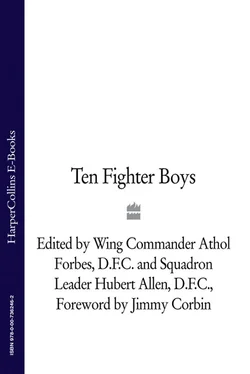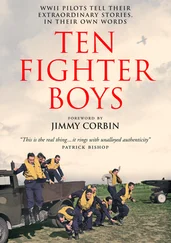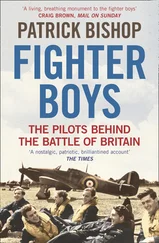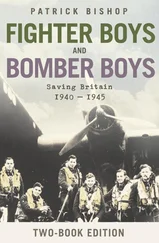I remember thinking it a good idea. Then the idea of this book sprang to life. I had always been interested in journalism, and for some unknown reason thought that I would be some use at the game. I knew that after the last war thousands of books had been published on life in the trenches, aerial combat, naval actions, etc. But why wait until after the war? People would be so much more enthralled to read first-hand about events that were going on all round at the time of reading. Even more so if the book was written jointly by a few of “the few” who were still living through all these immense happenings.
And we got to work. We began in November, 1940, and here, after many months of trial and error, is the result, by ten pilots, most of whom have seen action in the Battle of Britain, and later, in the Battle of France.
Three of the original authors are now dead – killed in action. A number of other pilots started to write about their flying experiences with us, but they were killed before their work had assumed sufficient proportions for inclusion in the book. But of the ten pilots whose work you are about to read, seven are still alive at the time of writing. God only knows how many will see the war through.
The original idea was that all the pilots in the squadron should write a few thousand words about their experiences in flying and combat. Each pilot would in this way write a complete chapter of the book.
No effort has been made to alter the phraseology. What you are about to read is as pilots would and did express themselves. The language is not always drawing-room. One doesn’t think in terms of drawing-rooms when one is 30,000 feet above the earth, turning and twisting to avoid a hail of lead and explosives. Raw, primitive, the instinct of self-preservation always to the foreground – that is how one’s mind works under those conditions, and in that manner this book is written.
I will give you a brief outline of the squadron concerned, and then of the pilots who are mentioned in the book.
The squadron was formed in the last war, and after disbandment re-formed in 1936. It was the original Spitfire Squadron, and carried out all the necessary squadron tests on that most loved of all aircraft.
The outbreak of war found it in East Anglia, and it moved nearer the coast just before Dunkirk. It fought over Rotterdam, The Hague, Dunkirk, and moved into the front line of London at the end of August, 1940.
Since then, it has done its quota over the Atlantic, over the North Sea, France, Belgium and Holland. I think it’s the best squadron in the Air Force, but then I’m prejudiced.
The members of the squadron were a truly motley throng, consisting of young men from every walk of life. Regular Air Force officers, sergeant-pilots who had, in peace-time, been dockhands, clerks, motor-mechanics; there was even an ex-dirt-track motor-cycle expert with us. Every conceivable type was represented.
I will now introduce you to the lads who wrote the book. Bob is a tallish, good-looking, fair-headed bloke, with a typical schoolboy complexion, liable to blush every now and then. He joined the squadron at the time when it was re-equipping with Spitfires. He can take his beer like a man, comes from the North and has a very typical Yorkshire outlook. A little shy, he may appear off-hand at first, but having broken down his barriers of reserve, you would find a lovable, gay, carefree youth of twenty-two years. He won his D.F.C. in October, 1940, for shooting down Huns. His father, funnily enough, served in the same squadron in the last war and won the M.C. and bar. We all hope that Bob will also get his bar.
Dizzy is a different kettle of fish who took longer to get his D.F.C., as might be expected from his character. Medium stocky build, he likes to call the colour of his hair titian or auburn – actually it’s red. He has just a touch of the old school-tie about him. He behaves as his name implies, being the life and soul of the party in his more convivial moments. In the air he is very cautious, and always behind before looking ahead.
He was most annoyed when someone cut his tail off one day and he had to bale-out. The air around his parachute was blue, but on receiving a very liberal amount of whisky at the local where he conveniently landed, his feelings were somewhat modified.
Bogle was a real character. Imagine a particularly husky “dead-end kid,” and you have Bogle. Being a strong individualist he is decidedly unconventional in appearance, usually wearing a uniform which, to say the least of it, would not pass muster on a ceremonial parade, with a colourful scarf round his neck and a large sheath-knife in his boot.
His language is foul, but he possesses more character than any one I can remember. Honest as the day, he is absolutely straight, and he never did any one a bad turn – with the possible exception of a number of Huns. He very soon got his D.F.C., and appears to prefer flying on his back to the right way up. A truly magnificent pilot.
Durex is young and noisy. The clown of the squadron, he can imitate every noise conceivable, from an underground train pulling out of a station to the ricochetting of a rifle bullet. Something had to happen before he would shut up – a little Durex went a long way. On his first operational sortie he shot down an ME. 109; on each of his next three sorties he was shot up himself.
Pickle is a funny little fellow. He’s thin and long-legged and looks half-starved, but he eats more than any one else in the squadron. His hair is all over the place; I don’t think even glue would keep it down, especially that funny little tuft slap in the middle. An amateur runner in peace-time, he walks twice as fast as any one else and leans forward as if he were pushing against a head-wind. You’d never think he could run a yard without breaking his legs, but if you try to catch him you’ll soon find out your mistake. He is completely hare-brained; talks fast and incoherently. In an aeroplane he flies faster and lower than any one I know. If Pickle is beating you up, you have to be on your belly to avoid him.
Half a pint of beer and Pickle is “well away”; a pint, and he goes to sleep in a corner.
Max was with us all too short a time before he was killed in a Channel dog-fight. He was a tremendously strong youth and an amateur boxer – a good fellow to have in a rough-house – and tougher than they make most of us. Shy, diffident, he had a good brain. When he just did not come back we felt his loss keenly.
Duggie was a flight-sergeant and had done a hell of a lot of flying. He was shot down, and baled out over Dunkirk, but he managed to get back in a boat. He has a very droll manner and a terrific scheme about a revolution after the war, so that the whole of the country can be governed by pilots – perhaps it is not such a bad idea either.
Parsons is now, alas, missing, believed killed over Holland. A first-class man, he realised a long ambition when he flew his first Spitfire, as he had been helping to make them at Vickers’ for many years before the war. Short and tubby, he was a little old at twenty-six to be a fighter-pilot, but he was just up for a D.F.M. when he was lost.
Binder Corbin finishes the list. Always moaning – usually about leave – he was the image of George Formby except that he was born in Kent and proud of it.
Thee average age of those boys was twenty-one years. At twenty-one they had seen more of Heaven and Earth – especially Heaven – than most people dream of at sixty.
A funny thing about our game is the suddenness with which things happen. I remember once going on patrol when I hadn’t seen a Hun for about four months, and then, incidentally, I only saw that one after my aeroplane had been hit by forty of his bullets, one of which went through my starboard arm. I had as my number two a raw sergeant-pilot, full of dash, absolutely fearless and with no idea about how to shoot down Huns. We were stooging along sixty miles out to sea after a so-called enemy aircraft, when I suddenly saw a few spots in the distance. On closer examination, they proved to be three Heinkels escorted by half a dozen ME.s. My first instinct was to bolt, but I went on. After a hell of a scrap, we got two ME. 109’s and the rest of the party retired in disorder.
Читать дальше












